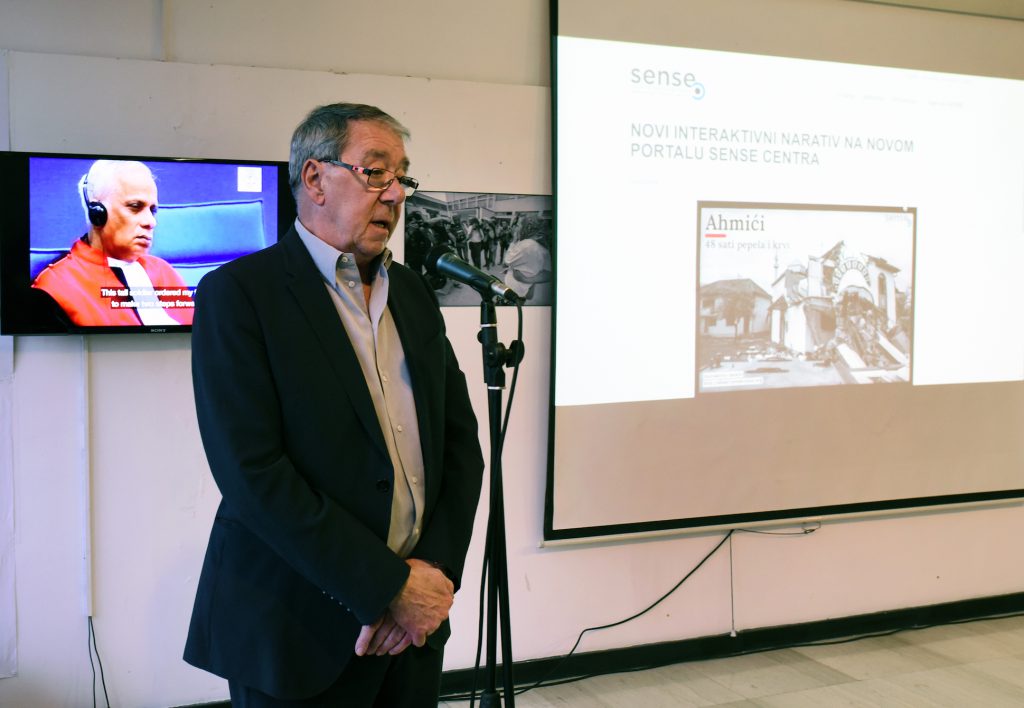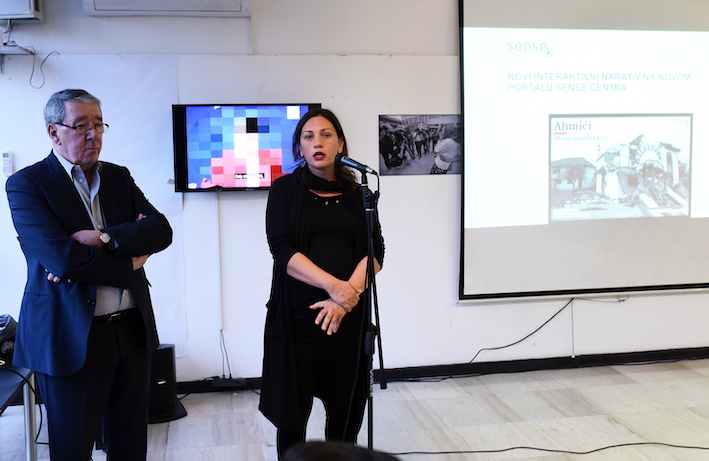
On 15 December 2022, Mirko Klarin, the editor of the Sense News Agency, died at the age of 79. Since the news spread, numerous people across the former Yugoslavia and beyond have been sharing just how much he did to advance the process of facing the past in the region. He was in fact, one of its pioneers. Lawyers, journalists, activists and human rights advocates, survivors—they publicly reflected on just how much he will be missed.
Klarin was a lawyer by training and had a distinguished career in journalism, but what he made his life work was reporting, independently and impartially, from the trials at the International Criminal Tribunal for the former Yugoslavia (ICTY) in The Hague. The Sense News Agency, which he founded, was the only media outlet which followed every session of every trial, pretty much from the beginning to the end of the Tribunal, from the mid-1990s to the end of 2017 and his team produced daily reports on proceedings, as well as a weekly broadcast shared with and transmitted by broadcasters in each of the formerly Yugoslav lands.
Klarin’s most notable contribution was his call to create a new ‘Nuremberg’ for the Yugoslav lands. As the Yugoslav federation dissolved and war was loomed, Klarin already wrote an important piece in the Belgrade-based regional newspaper Borba, in May 1991, called ‘Nuremberg now.’ In the piece, he already called for action to prevent the growing radicalisation and the threat of violence, which was spreading across Yugoslavia. From that moment onwards, unable to stop what was happening, he dedicated the rest of his life to justice. His mission was to bear constant witness to everything that happened in The Hague court that emerged from his inspirational call. He brought some of that crucial information to the publics in the former Yugoslavia. He was unflinching in his dedication to this mission and uncompromisingly fair and impartial. He was equally critical of perpetrators and policies and acts from all sides, and that was such a rarity — and he was ever ready to criticise the ICTY’s processes and handling of cases. Every day, reports could be found about the detail of every trial sitting (and there were dozens over the two decades, and sometimes six at the same time). Each week for years, TV audiences could watch the 30-min program he and his team prepared, bringing crucial developments from the Tribunal to citizens in Croatia, Bosnia and Herzegovina, Serbia, Kosovo and elsewhere.
Klarin understood the fundamental reluctance of states and politicians to acknowledge and prosecute alleged crimes committed by their own side. He knew the power of the simplistic narratives of ‘us’ as good and ‘them’ as bad — ‘we’, the victims and heroes, ‘they’ the perpetrators and tormentors. What Klarin and his team did was what many other should have done: to rise above the ethnic lens and to see and to care for humanity and human suffering. Sadly, that did not happen. He was always in the minority in the way he worked. States in the region should have done much more to face the past, had they had the wisdom, foresight and genuine care for survivors at heart. He was on the side of the victims, all victims, everywhere.
Sense News was, and remains, an important repository of crucial reporting from the trials, making the enormous trial records just a little bit more digestible for researchers. That is what Karin dedicated his final years to doing —building on the Sense work in The Hague. One way in which he did this was by opening a modern and informative Sense Documentation Centre at Potočari on the Srebrenica act of genocide in July 1995, in 2014 — not an exhaustive presentation, but highly effective and for some years outshining the neighbouring official memorial. The other big way was his founding a Transitional Justice Center in Pula, Croatia, as the Tribunal and his mission in The Hague came to a close. There, he focused on education and the need to try to incorporate the ICTY evidence as fully as possible in history teaching and in learning across the region. He spent time thinking about how to fight denial of the crimes which took place. In these projects, with his team, he was dedicated to preparing multi-media projects and exhibitions that would bring ICTY trials closer to citizens across the region, including by making complex legal findings accessible to the general public via internet presentations.

As well as his work with Sense, Klarin collaborated with others, including the War Crimes Research Group (WCRG) on the Pictures of Peace and Justice project in 2010-11, along with Iva Vukušić (working as archivist at Sense at the time), providing material to assist in research and working on a joint workshop with the Imperial War Museum. He also worked several times with the History Museum of Bosnia and Hercegovina, another key partner of WCRG, including organising a major exhibition on the legacy of the ICTY with Museum Director Elma Hašimbegović in 2017.
Mirko Klarin was born in 1943 in Trogir, on the Dalmatian coast and died in Brussels on 15 December. His contributions leave us all indebted and with a mission to continue his life’s work: advancing the project of facing the past in the former Yugoslavia, of rejecting violent nationalism and refusing to accept hate and brutality as instruments of politics.
Iva Vukušić and James Gow
Dr Iva Vukušić is Assistant Professor in International History at Utrecht University, and a Visiting Research Fellow at the Department of War Studies, King’s College London. She is a historian and a genocide scholar, and her work is on irregular armed groups, genocide, mass violence and transitional justice, especially criminal accountability. She is a frequent contributor in public debates and has been interviewed for the New York Times, the Guardian, Le Monde, Der Spiegel, de Volkskrant, the BBC, etc. Her first book, Serbian Paramilitaries and the Breakup of Yugoslavia: State Connections and Patterns of Violence, was published in September 2022 in the Contemporary Security Studies series at Routledge.
Professor James Gow is Professor of International Peace and Security and co-Director of the War Crimes Research Group in the Department of War Studies at King’s College London.
